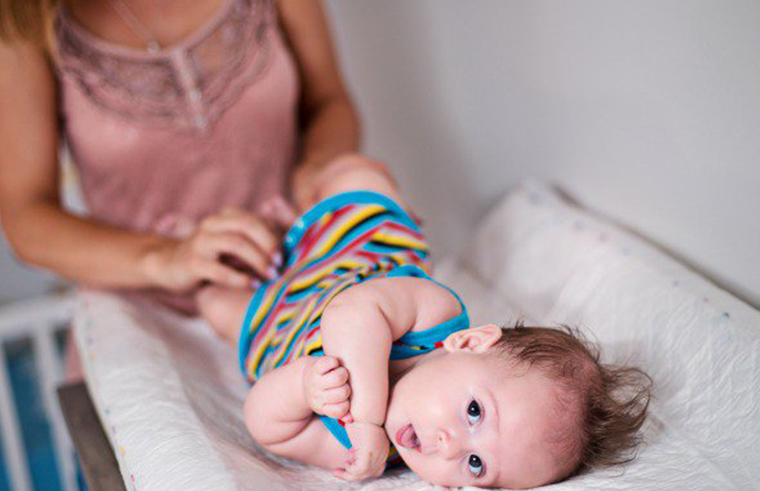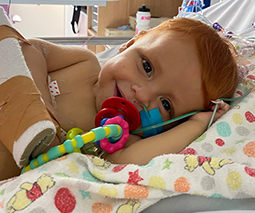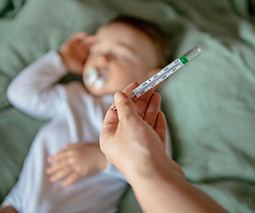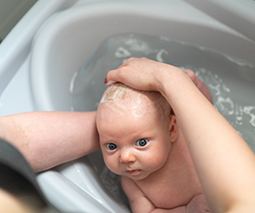Does size really matter? A guide to what’s normal for your son’s genitalia

If you’re wondering if your son’s penis or scrotum is too small, don’t worry you’re not alone. It’s completely normal to question what’s ‘normal’ when it comes to the size of your little boy’s genitalia. In some cases, it’s actually really important that you do. Here’s a guide to help you make sense of what’s what ‘down there’.
Testicles and scrotum
Firstly, let’s start with the testicles. A baby boy develops these in his abdomen while inside the womb and by the time he is born (or not long after) they descend into their scrotum sack. It’s really common for this descent to cause extra fluid resulting in swelling, which is why a lot of male babies appear to have a particularly large scrotum compared to their body. Within the first few months, this should go down and their sack will appear more in proportion; however, if it remains quite large it’s most likely genetic and usually isn’t anything to worry about.

Descending issues
The more crucial issue when it comes to a baby’s testicles is not the size, but whether or not they have actually descended. Sometimes one or both may take longer than normal to come down (more than a year), due to a pubic fat pad around the base of the penis, and a surgical procedure may be required to locate them and bring them down. In rare instances, though a teste may have twisted and withered higher up which requires removal to prevent testicular cancer, so it’s important to check that their testicles have descended.
If you’re not sure, try looking when they’re in the bath (they tend to float) or gently feel for them. Your doctor should also check at your son’s six-week checkup, but if you’re unsure ask them again to take a look.
A tiny penis or not?
Then on to the penis, which is more often the reason for concern from parents. Just like adult penises, they do come in all shapes and sizes for little boys and should grow larger as they develop, making them seem more in proportion.
As a rough guide though, if your baby is five months or under and their penis (when stretched) measures 1.9cm (0.75 inches) or under, this is considered abnormal and you should seek advice from a doctor.

Inconspicuous penis
If your baby son’s penis does appear to be very small, or is possibly even absent, then this is what’s known as an inconspicuous penis and it could fall into one of the following categories:
- Webbed penis – Where skin from the scrotum extends up the shaft of a normal-sized penis making it appear smaller. Either born this way or a result of circumcision, it can easily be fixed with surgery.
- Concealed penis – Also called a buried penis, where a normal-sized penis is hidden in the pubic fat pad at the base of the penis form birth or after circumcision. Sometimes surgery is required. However, if you can expose the penis by pressing down on the fat pad or gently pulling it, then it should correct over time.
- Trapped penis – Where a normal-sized penis is stuck in the pubic fat pad as a direct result of circumcision (either where scrotal swelling or a webbed penis circumcision has taken place). Surgery is advised to prevent urinary tract infections.
- Micropenis – A hormonal issue where the penis has not developed sufficiently to be of a normal size (less than 1.9cm in a newborn). Hormone levels and chromosomes will need to be checked, with testosterone often given which can encourage penile growth. In cases where testosterone doesn’t work, the discussion of gender reassignment may be raised. However, this is often not considered necessary now, given that long-term studies show that male adults born with a micropenis can still have a strong male identity, urinate standing up, have erections and enjoy sex.
If in doubt
The bottom line is that if you’re at all concerned about the size of your son’s genitalia then please speak to a doctor in case there is a medical issue that needs attending to. In many cases, even though it may appear small to you or your partner, over time it will usually grow and look perfectly normal.
On the flip side, if your child’s penis looks unusually large, swollen, red or sore then this should be investigated also because there could be a health problem at play.
If you’re concerned about the size of your baby son’s penis or scrotum or any other issues with their genitalia then please speak to your doctor.
Read more stories like this:
- 7 common penis problems in little boys and how to solve them
- Everything you wanted to know about little boys and their erections
- Does size really matter? A guide to what’s normal for your son’s genitalia
- Mums of little boys: Here are 7 fun facts about the penis and testicles
- Why retracting your uncircumcised baby boy’s foreskin is not a good idea
- Flustered or clueless? Everything you need to know about toddler masturbation
- What you need to know about caring for your little boy’s genitals
- An expert answers 8 common mum questions about little boys’ penis health
- Toilet training: Why does my son give himself erections and pee everywhere?
- Weighing it up: Sorting through the pros and cons of circumcision
- Babies can get a urinary tract infection too – here’s what you need to know








